"The collegiate system makes you aware that your individual academic progress and welfare is being looked after."
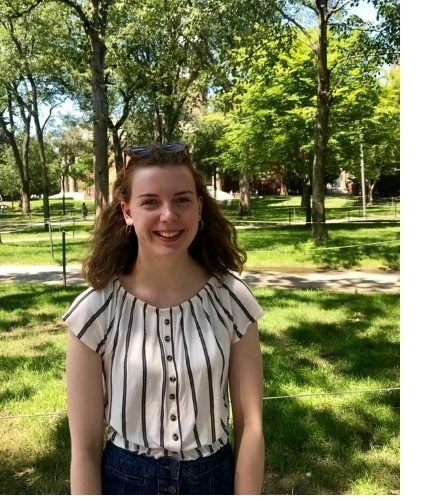
Iona is from Edinburgh, Scotland, and wrote this profile at the end of her first year studying Medicine here at Christ’s College, Cambridge. At school, Iona did Scottish Advanced Highers in Maths, Biology and Chemistry.
Why did you choose Medicine at Cambridge?
Coming from Scotland, I was very apprehensive about considering Cambridge as an option. This was a little to do with the distance, but more due to the thought of paying tuition fees (univeristy is free in Scotland for Scottish students) and the fact that my school had very little experience of sending students to Oxbridge. I visited Cambridge on an outreach program at the start of S5 (the penultimate year of secondary school) with my school, and that’s when I first considered Cambridge as a possibility.
If you're from Scotland and considering applying to Cambridge I would definitely say go for it! Although the thought of paying tuition fees is daunting, SAAS offer loans which are paid back gradually only once you earn enough after graduating. Other support is sometimes available e.g. for medicine SAAS currently says they will fund year 5 (check SAAS website for current guidelines though as this may change). Applying with Scottish Advanced Highers instead of A levels can be more difficult to get advice on, especially online. I would recommend getting in touch with College admissions staff directly if you're confused about the standard requirements and offer conditions. Don't be worried about having not done A levels once you're here though - I found it really easy to catch up on any topics I'd missed through the lectures and there was also stuff which I'd learned that others hadn't. Overall, Cambridge is a great university with a wide range of people from different backgrounds. I'd definitely recommend applying!
I already knew Medicine was the course I wanted to study when I was choosing my university applications. I decided on Medicine part the way through S4 after attending some outreach events. I chose it because of my enjoyment of science and problem solving, and because I also knew that I wanted to work with people after volunteering in a nursery and a hospital.
What’s unique about the course here?
The Medicine course at Cambridge is very traditional, in that it is split into 3 pre-clinical and 3 clinical years. I really like this format, as I prefer to be confident in my knowledge before applying it to new situations. This does mean that you will get relatively little patient contact in the first few years. However, this year we did visit a GP practice where we conducted patient interviews in the surgery and in a patient’s home. This was a nice way to be reminded of the end goal of our science training.
The Cambridge course is also different to other courses as it teaches the traditional subjects of biochemistry, physiology, anatomy separately, rather than teaching by organ system. I didn’t find these particularly difficult to tie together myself though.
For anatomy, Cambridge still teaches through full-body dissection. The first time doing this can be nerve-wracking, but the demonstrators were really mindful of everyone’s feelings and prepared us well. You can get as involved as you like in the actual practical dissection, but I found being talked through the pro-sections by the demonstrators very useful. At the end of the year a tribute service is held for the donors, which is a lovely way of thanking them, their friends and family.
What made you want to apply to Christ’s?
When I visited Cambridge with my school I stayed in a different College, but found the location to be a little too far outside the centre of town. This helped me narrow down my options to the more central Colleges. I read both the official and alternative prospectuses online, as well as visiting the College websites. In the end I had about three Colleges that met my hopes in terms of location, appearance, accommodation and facilities. Christ’s ended up being my final choice due to the useful and friendly website resources, as well as the range of societies that were on offer.
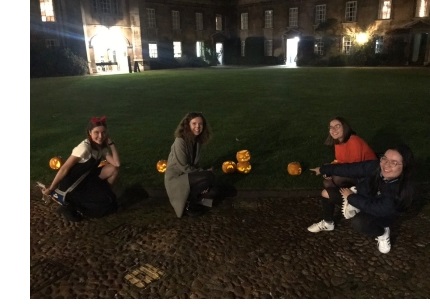
Halloween
Christ’s generally has about 14 medics per year, which seemed like a good amount as it’s not too big or small. I wasn’t aware before applying, but Christ’s has a great track record for Medicine too!
What do you think of the collegiate system in general?
I personally really like the collegiate system. After only a few weeks, Christ’s began to feel like home! Being in a year of 120 students makes you aware that your individual academic progress and welfare is being looked after, rather than you feeling lost in a sea of thousands of students. The smaller number of people in one year at Christ’s means that you are able to find people with both similar and different backgrounds and interests as you. I have only occasionally visited the grounds of other Colleges during term time, as all of my supervisions and most of my friends are at Christ’s.
How did you find the application process?
I found the application process to be quite long – it might have been difficult to navigate had it not been for the clear guidance from the Cambridge website and the Christ’s website and admissions staff. My school offered some support, by notifying me of local events where Oxbridge students and teachers came to speak about the admissions process. I was given advice to make my personal statement more academically focused than it would have been if I was applying only to other universities, which I think is definitely worth following.
Did you have to sit any pre-interview admissions assessments?
Cambridge requires you to sit the BMAT. I chose to sit mine in November, as this gave me more time to prepare after doing the UCAT (required by some other universities) in late August. I found preparing for the BMAT more difficult than the UCAT, as I knew nobody else who was sitting it or had ever sat it. The science section was particularly challenging for me as it was based on GCSE and A level topics, which included lots of things which my Scottish National 5s and Highers had not covered. The BMAT website does have a specification, which helped me to target the gaps I had!
I would recommend the ISC Medical book ‘700 BMAT Practice Questions’ by Campbell and Picard. I think practice under timed conditions is the best way to improve your BMAT score. Remember your BMAT score is not the only determining factor for getting an interview or offer – my scores weren’t particularly good but they look at your application as a whole.
"The BMAT science section was particularly challenging for me as it was based on GCSE and A level topics."
How did you prepare for your interview?
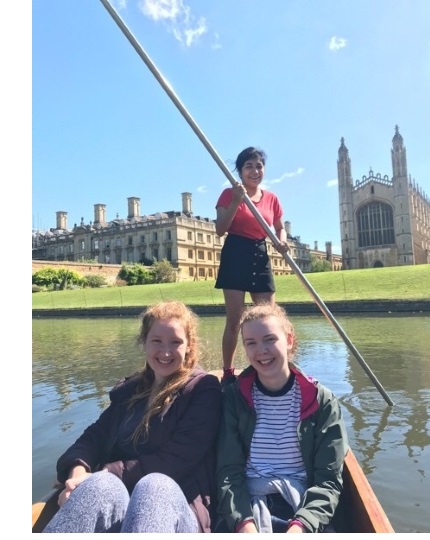
Cambridge was the first university interview I had, which was very nerve wracking. I prepared by reading ‘Medical School Interviews’ by Picard and Lee (ISC Medical) which I found very useful. I also used resources on the Medic Portal website, which give a good overview of what could come up in any medicine interview. I also kept up to date with health and science news using the BBC news app and then researched some of the headlines that interested me more thoroughly.
For Cambridge, make sure you know the Biology and Chemistry you have learned so far in school really well and practice applying it verbally to new situations. My teachers also helped me to prepare by giving me a couple of mock science-based interviews.
Were you nervous about coming to Cambridge?
I came to Cambridge the autumn after I finished school, and was looking forward to becoming more independent. I was also very excited to have the chance to meet loads of new people and be stretched academically. Because of the way Scottish schooling works, I was 17 when I started at Cambridge and so I was a bit nervous that I would struggle to meet people at the start.
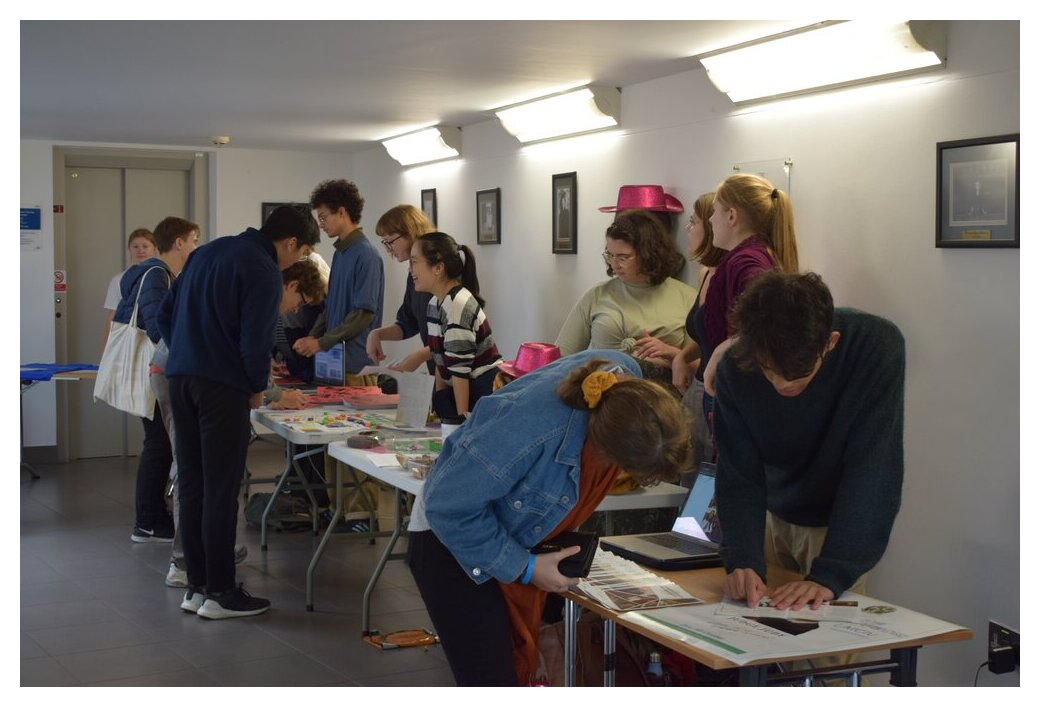
I actually found this not to be the the case! I’m really grateful for the College system, which made it easy to meet people through a wide variety of events put on by each College during Freshers’ Week and beyond. Christ’s had a very busy Freshers’ Week timetable which meant I had no problem finding people to hang out with. So don’t worry if going out isn’t your thing! I enjoyed the subject socials, freshers' picnic, Freshers' Fair (there are both College and university ones) and the theatre trip organised by the drama society at Christ's, CADS. The University-wide Freshers' Fair is a huge event that takes place over a couple of days in a large park in Cambridge. All of the university societies set up stalls and advertise to the new first years. It's a fun event and a good chance to see what's on offer and sign up to mailing lists. There's also lots of freebies - including pizza!
"Christ’s had a busy Freshers’ Week timetable which meant I had no problem finding people to hang out with."
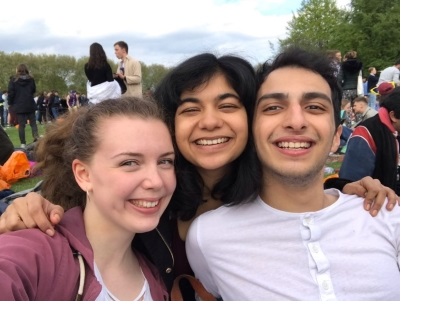
What were your first few weeks at Cambridge like?
Settling in took a few weeks, and there were definitely times where I missed home and friends. However, by the end of term I was beginning to really enjoy my time at Christ’s. I was pleased to find that everybody at Christ’s was super friendly and the older years also helped to make us feel at ease. Although there are many Cambridge stereotypes, you will quickly find that everyone at Christ’s is normal and are all there for the purpose of exploring their subject and enjoying university life.
Cambridge’s Freshers’ Week goes pretty quickly (it’s actually less than a week!), and the medics began to get introductory lectures and labs the first Wednesday after arriving. The first few lectures are taken at a slower pace to ease you in, and tend to cover things already done in A-Levels/Advanced Highers. The first supervisions were also a bit strange, as the teaching style was very new and we didn’t really know each other, but they quickly became normal. As I mentioned before, watching dissection for the first time was probably the biggest shock.
How is your course taught?
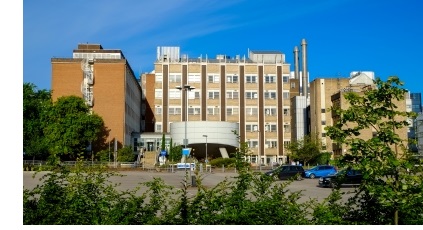
In a typical week medics have about 20-25 contact hours which includes lectures, dissections, practicals and supervisions. Medicine is probably one of the courses with the most contact hours – however, the timetable does vary a bit from week to week so you have some flexibility. You can expect to have about 10 lectures, 2 dissections, 1 practical and 3-4 supervisions per week.
I personally attended almost all lectures this year, as I found them useful. Some lectures are recorded, and all lecturers provide lecture notes, so attending is not compulsory and some people choose not to go to them all. I preferred to read through lecture notes afterwards, but to read through the dissection manual before classes. I had about two essays per week to write, but these don’t count towards your final grades. This year we had two smaller exams at the end of Lent term, and the rest at the end of Easter term.
I managed my workload by keeping all my academic and extracurricular activities in my phone calendar and keeping an up to date to-do list. I still tried to take up the offer of doing something with friends when I could, though. It’s important to remember that the holidays at Cambridge are long, and offer a chance to catch up on work if you need to!
What’s been your favourite part of the course this year?
My favourite topic this year has been Physiology, as I enjoyed learning how different organs and systems work. Physiology also nicely tied in a lot of anatomy and biochemistry, and showed their clinical relevance, which I liked. For this reason, I also really enjoyed the clinical and applied sections of the dissection manual.
What are your favourite, and least favourite, things about Cambridge?
My favourite thing about Cambridge is getting to study a subject I really enjoy with other people who are also super enthusiastic about their subjects. There is a great sense of community at Christ’s as everyone understands the high workload but are able to support each other and laugh about it all the same. My least favourite thing about Cambridge this year was that sometimes I felt a lot of academic pressure, due to the high standards of everyone around me and the general Cambridge reputation. Getting through first year though has definitely boosted my self confidence, however, and I think I will find it easier next year to monitor my own progress and know that I’m keeping up.
"There is a great sense of community at Christ’s."
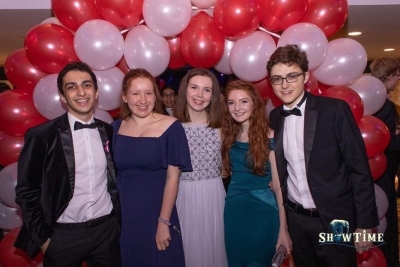
What do you do in your free time?
When I’m not working I like to hang out with friends in my corridor and have a catch up over tea. Upper Hall (our College canteen) is also great for seeing people outside your subject. I also enjoy going out sometimes in the evenings. This year, I joined a few societies including the ballet society, and took part in their annual show. There are so many societies with different commitment levels so, I would definitely sign up to lots at the university freshers fair and try them all out before sticking with a few. Next year I’m going to continue dancing, and will take up the role of ScotSoc access officer to help with outreach work in Scotland.
Medics are very social and there are both Christ’s and university wide medical societies. Christ’s MedSoc puts on an annual formal dinner and termly medic curry and welfare events. These are a good chance to get to know the older medics, including the clinical medics occasionally! There is also an annual MedSoc ball hosted by the Cambridge MedSoc which is great fun.
What are your plans for next year?
Next year I’m looking forward to learning some more specialised areas of medical science now we have all the foundations from first year. I don’t get a choice of papers next year – all medics take the same subjects. I’m hoping a certain topic next year will stand out to me as the option I pick to study in depth in third year, which is when medics get to choose what subject to study and do a research project or dissertation on.
I’m hoping to be more efficient with my time now I know what’s expected of me and how I learn best. This way I can also maximise my down time! I’m living in one of the College's Jesus Lane houses next year. Jesus Lane is only a few minutes walk from Christ's, and my neighbours will all be second years too which is nice. I think I’ll enjoy having that extra independence outside of the main site, and it’s going to be lots of fun sharing a house with friends.
July 2019
Please be aware if you're considering an application that our student writers describe their experiences. Although the majority of the information stays the same, some details may change from year to year. Do read the student profiles in combination with our undergraduate admissions pages for full information.
Student profiles page / Medicine at Christ's / Applying from Scotland / Next: Juliet's profile
